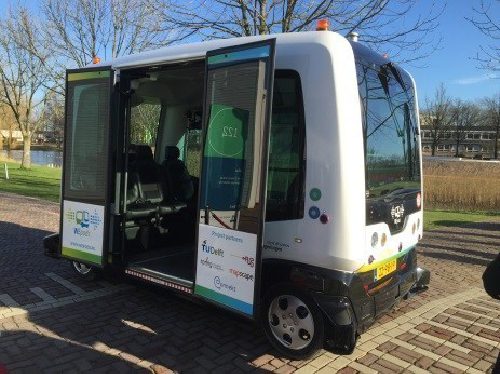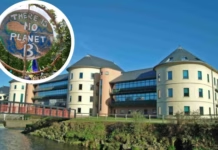EB software and Mapscape digital maps support WEpods, the first autonomous electric shuttles to drive among normal traffic
Elektrobit (EB), a leading developer of cutting-edge, embedded technology solutions for the automotive industry, and Netherlands-based digital map provider Mapscape, today announced their contributions to WEpods, the world’s first completely autonomous shuttle buses that will use public roads. EB and Mapscape together provided an enhanced electronic horizon solution for assisting in motion prediction and path planning of the autonomous shuttle bus. Based in the Netherlands, WEpods is a community project in cooperation with the Dutch province of Gelderland and students from the Wageningen University & Research Centre and Delft University of Technology (TU Delft). The WEpods project was first introduced to the public on January 28th.
Mapscape has provided an NDS (Navigation Data Standard) map database with comprehensive road geometry data that provides more detailed information for objects and pinpoint locations than standard map information. The enriched data from Mapscape is then delivered to EB’s electronic horizon solution, which generates highly precise positioning information in accordance with the open ADASIS v2 specification with a range of enhancements, such as lateral offset from the road center line. This electronic horizon data is continuously updated as the vehicle is driving autonomously. It is then interpreted by EB’s ADASIS v2 Reconstructor software module into information usable by the shuttle’s ECUs, enabling the driverless vehicle to prepare for and respond to real-world situations. In case of emergency, passengers can directly contact the WEpod control room from within the shuttle, which continuously monitors vehicle safety. Shuttle attendants will also be on board to assist passengers during the test phase.
As one of the first passengers, Dutch Minister of Infrastructure and the Environment Schultz van Haegen ushered in the pods’ three-month test phase. The six-seater, handicap-accessible buses without steering wheel or pedals will be the first completely autonomous vehicles to drive on public roads. Unlike their driverless predecessors, like the Rotterdam Rivium Park and Heathrow shuttles, which require magnets, rails or special lanes, WEpods will maneuver through normal traffic using a complex set of sensors, cameras, radars, lasers and controls, designed to monitor and both quickly and reliably respond to changes in environment or traffic conditions.
There are currently two WEpods in service in the Dutch province of Gelderland, running between the towns of Wageningen and Ede, though plans for expansion are in place. With a maximum speed of 40 km/h (25 km/h during the test phase), the fully electrical WEpods have a range of approximately 100 km per charge. Initially, WEpods will run a predetermined “bus” route exclusively on the Wageningen University campus. After the test phase is complete in May 2016, a “taxi” mode will take effect, where passengers will be able to request a WEpod via smartphone app, and the shuttles will independently create their own itineraries. The Gelderland province hopes to set an example for other cities in its move toward more flexible and sustainable mobility.
“The WEpods project is a leap forward in the world of autonomous driving, a key illustration of how the collaboration of innovative minds can push the boundaries of how we move,” says Björn Giesler, Head of Driver Assistance at EB. “at Elektrobit we’re proud to contribute our expertise to this pioneering project together with our long-standing business partner, Mapscape, bringing the first autonomous vehicle to public roads. Initiatives like these that shape the future of transport are exactly what motivate our talented team to develop advanced products like the ADASIS v2 reconstruction software”.
“We are pleased to be in a position to support and inspire the engineers of tomorrow at TU Delft,” says Harald Hagenaars Senior Business Development Manager at Mapscape. “In conjunction with the unique capabilities of EB’s electronic horizon software, Mapscape’s unique mapping data is right at the heart of WEpods. EB and Mapscape will continue to enhance WEpod’s driving experience overtime with new functionalities, like dynamic electronic horizon and incremental map updates.”

| [donate]
| Help keep news FREE for our readersSupporting your local community newspaper/online news outlet is crucial now more than ever. If you believe in independent journalism,then consider making a valuable contribution by making a one-time or monthly donation. We operate in rural areas where providing unbiased news can be challenging. |


















